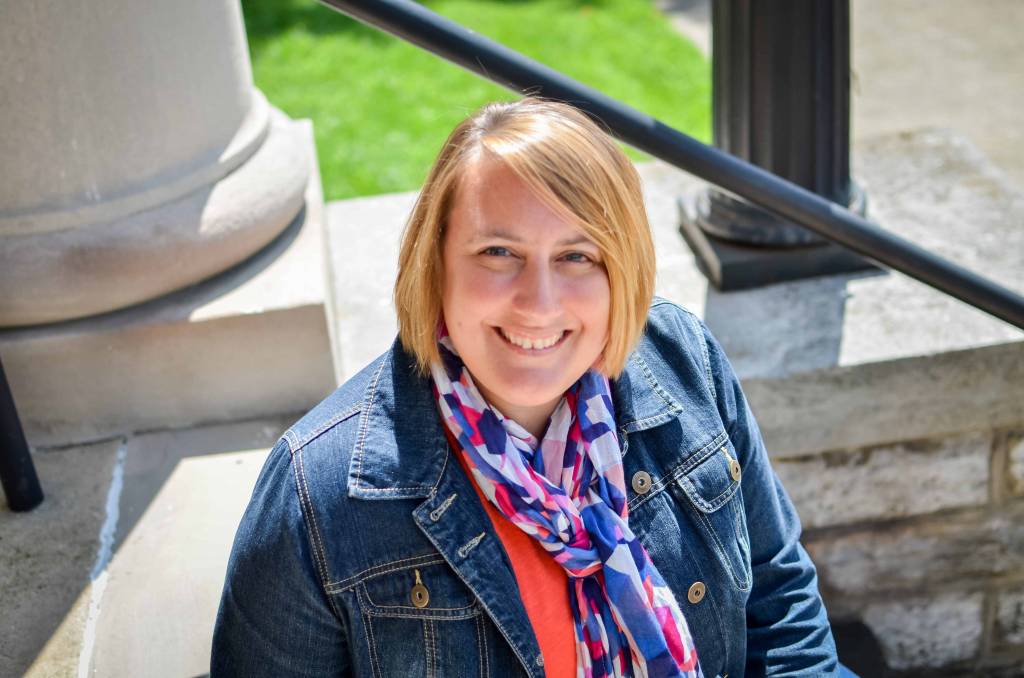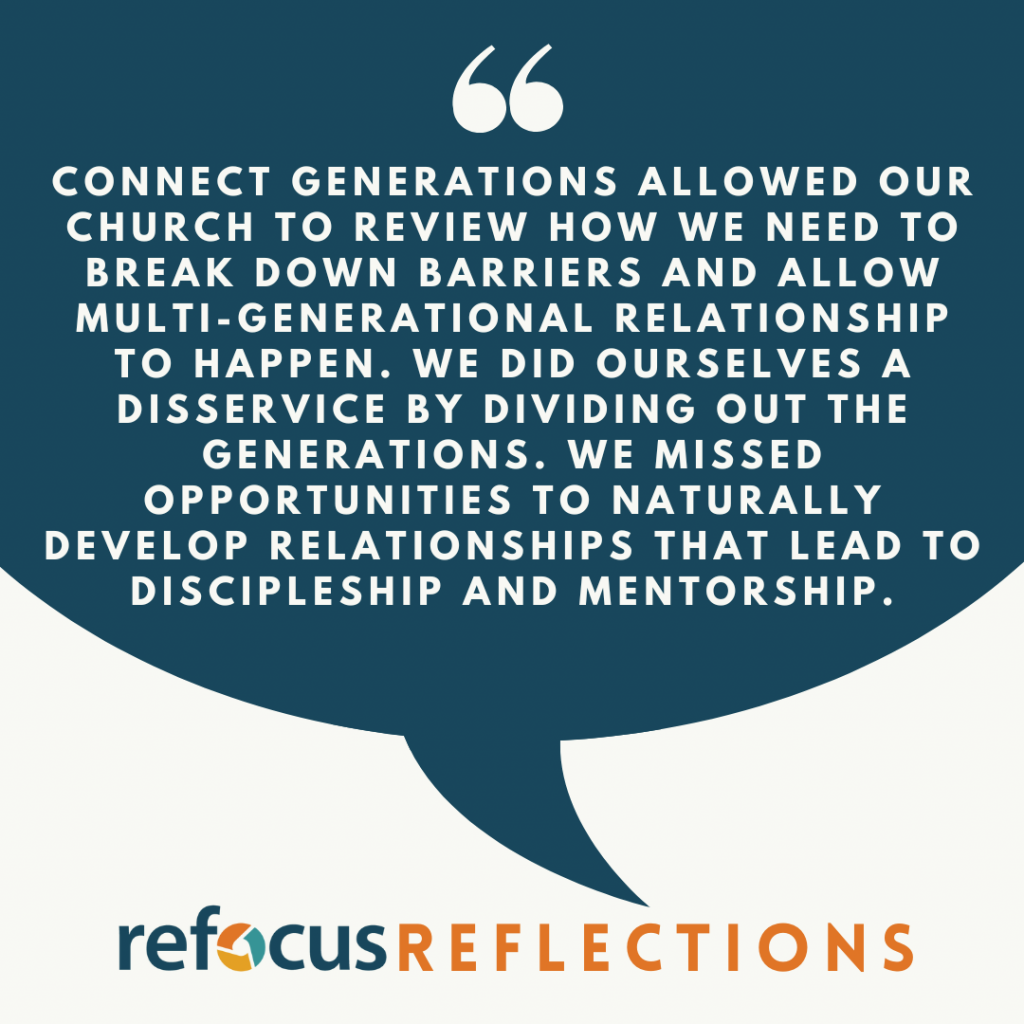Whenever there’s a question about why something is happening, there’s almost always a researcher trying to answer it.
Why are young adults leaving religion? Why are older generations suffering from the highest rates of suicide? Why are youth experiencing increasing anxiety and mental illness? Why are children experiencing a lack of socialization? Why are more and more people making money through a gig economy and start-ups rather than joining established corporations?
Over the past two decades, a plethora of research has been done to answer these questions.

But for the questions listed above, research has produced a common thread – age segregation or the separation of people based on their age. An increase in age segregation and a lack of intergenerational relationships has contributed to the rise in every one of these areas.
A quick Google Scholar search of “age segregation” will send you down a dizzying path of articles, abstracts, and analyses that most of us just don’t have time to read let alone study.
But I did.
For the last five years, I’ve spent hours and hours of time pouring over this research and the answers to these questions with one goal in mind – to help the church recognize and identify the structures of age segregation in their faith communities and begin to build bridges between generations.
I asked different questions.
I asked, “What would happen if we took all of the research on age segregation that has been done in society and applied it to the church?”
I questioned, “What impact does age segregation have on young people leaving the church?”
I wondered, “If age segregation is present in the church, are we experiencing the same consequences in the church as the larger society does?”
I considered, “How does separating people based on ages and stages of life affect our great commission to ‘make disciples’ and to pass on our faith?”
And as I asked these questions, a pattern began to emerge in both the research that has been done and the application I was making to the church.
First, I began to see the structures of age segregation in four distinct places, or what we are calling Pillars at ReFocus. These are the things that hold up both age segregation AND age integration in our churches.
- Institutional Pillar – This pillar includes such things as leadership structure, committee membership, programming and services offered by the church. Think of this section as the “bones” of your church body; the skeleton that gives shape and structure to your congregation.
- Spatial Pillar – This pillar looks at all the things that shape your physical experience like building design, worship space design, hallway design and common spaces. Think of this section as the “flesh” of your church body; the appearance that gives context and personal touch to your congregation.
- Technological Pillar – This pillar includes all things tech or media like your website, social media pages, written or print materials, and verbal announcements. Think of this section as the “senses” of your church body; the information that gives sight, sound, smell, and taste to your congregation..
- Relational Pillar – This pillar is the one we tend to think about the most when it comes to community. It includes the age-integrated spaces in your church, Sunday School classes and mid-week opportunities, and church activities outside the building. Think of this section as the “life” of your church body; the actions and activities that bring movement and interaction to your congregation and into your community.
Second, I was most interested in the impact that age segregation could be having on spiritual formation and discipleship within a congregation. Most books and articles I read about age segregation in the church simply stated that churches tended to be age-segregated. And that is easily observed by looking at how church buildings are designed, curriculum is created, and programs are run. But observation alone doesn’t mean that age segregation really exists.
Could parallels between society and church be found and if so, what could they tell us about how age segregation impacted discipleship?
The answer to that question is a dissertation…. Literally. That’s what I wrote my doctorate thesis on. So I am not going to bore you with it here suffice it to say… there is an impact. And the impact is such that without spaces and places and ways for intergenerational connection that are intentionally utilized to facilitate meaningful relationships and given the tools and support needs for generational discipleship, our faith is not being passed on from “one generation to another” as Psalm 145 declares.
Our faith is instead being shared only in echo chambers of those who look and sound and think like us. We’re not “passing” anything on because we aren’t in relationship with people who can be passed something.
If you’ve been following ReFocus Ministry over the last few years, you’ve seen a decided shift in the direction of intergenerational ministry. This is partly because of the research I was immersed in. It was partly because of my doctoral courses in spiritual formation and the practice of lifelong discipleship. But it was mostly because I became more and more convinced that this practice of separating the body of Christ based on age and life experience has had and continues to have a huge impact on our call to make disciples.
In the world of KidMin, Youth Ministry, and Family Ministry world, there are many voices speaking into the age-specific and age-sensitive spaces but not as many speaking to this important intergenerational aspect of discipleship.
To be clear, I am not “against” age-specific programs and approaches however, I am unconvinced that while it is the most readily resourced and common approach to ministry, it is the best approach. Everything I’ve read and researched over the past several years has led me to believe, more than ever, that we need each other – together, learning and worshiping and in relationships, growing as the body of Christ, in community. It may not be the easiest path forward and it may take a great deal of creativity and flexibility, but if it leads to the end result of connecting generations in meaningful relationships that lead to discipleship, mentorship, and lifelong faith formation, I believe it’s worth every bit of effort.
If you are interested in learning more about these topics and exploring ways to connect generations at church and at home, I invite you to reach out and let’s start a conversation. Send your questions, your frustrations, your skepticism, and your anticipation and let’s work together to build communities of faith integrated with one another and growing in a rich relationships of lifelong faith formation.
Connect Generations: A Ministry Assessment Tool for Discipleship
Are you ready to connect the generations in your church community?
Looking for ways to help the older generations and younger generations to come together for discipleship, mentorship, and relationship? Check out Connect Generations from ReFocus Ministry. It’s a simple self-assessment that can be done by a church in less than a week that offers specific insight into the barriers and bridges to connect generations. And it includes a FREE follow-up coaching session to create a plan for the future. Learn more here.
About the Author

Christina Embree is the founder and director of ReFocus Ministry. She holds a masters in ministry focused on Children, Youth, and Family Ministry and is completing her doctoral degree in spiritual formation with a focus on age segregation and intergenerational ministry.
In addition to coaching churches of multiple denominations and traditions all around the globe, Christina serves as the Minister of Generational Discipleship for the Great Lakes Conference of the Brethren in Christ and as a pastor at Plowshares Brethren in Christ in Lexington, Kentucky. She is widely recognized as a speaker and author in the areas of generational discipleship, intergenerational ministry, and family ministry. As the mother of three children, she is familiar with the challenges of faith at home and pastoral ministry. She along with her husband Luke share a love for the church, their community, and the global work of peace and restoration through Jesus



